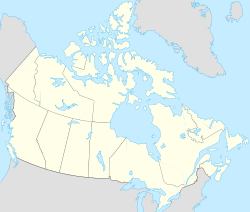
St. Catharines is the largest city in Canada's Niagara Region and the sixth largest urban area in the province of Ontario, with 96.13 square kilometres of land and 133,113 residents in 2016. It lies in Southern Ontario, 51 kilometres (32 mi) south of Toronto across Lake Ontario, and is 19 kilometres (12 mi) inland from the international boundary with the United States along the Niagara River. It is the northern entrance of the Welland Canal. Residents of St. Catharines are known as St. Cathariners. St. Catharines carries the official nickname "The Garden City" due to its 1,000 acres (4 km2) of parks, gardens, and trails.

The Golden Horseshoe is a secondary region of Southern Ontario, Canada, which lies at the western end of Lake Ontario, with outer boundaries stretching south to Lake Erie and north to Lake Scugog and Lake Simcoe. It includes the Greater Toronto Area. The region is the most densely populated and industrialized in Canada. With a population of 7,826,367 people in its core and 9,245,438 in its greater area, the Golden Horseshoe accounts for over 21 percent of the population of Canada and more than 55 percent of Ontario's population. It is part of the Quebec City–Windsor Corridor, itself part of the Great Lakes Megalopolis.

The Regional Municipality of Niagara, also colloquially known as the Niagara Region, is a regional municipality comprising twelve municipalities of Southern Ontario, Canada. The regional seat is in Thorold. It is the southern end of the Golden Horseshoe, the largest megalopolis in Canada.
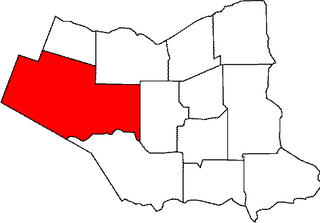
West Lincoln is a township in the Niagara Region of Ontario, Canada. Main urban areas are located along the former provincial Highway 20. The administrative centre of West Lincoln is the community of Smithville, situated halfway between Hamilton and Pelham.

Dean Allison is a Canadian politician. He was elected to the House of Commons of Canada in the 2004 federal election for the riding of Niagara West—Glanbrook, now Niagara West. Allison is a member of the Conservative Party of Canada and has been re-elected in each subsequent election.

Lincoln is a town on Lake Ontario in the Niagara Region, Ontario, Canada. The town's administrative and commercial centre is in the community of Beamsville.
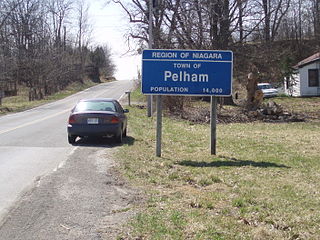
The Town of Pelham is located in the centre of Niagara Region in Ontario, Canada.

Wainfleet is a rural township in southern Niagara Region, Ontario, Canada.

The Niagara College of Applied Arts and Technology is a public College of Applied Arts and Technology within the Niagara Region of Southern Ontario, Canada.

Hamilton, from the point at which it was first colonized by settlers, has benefited from its geographical proximity to major land and water transportation routes along the Niagara Peninsula and Lake Ontario. Its strategic importance has created, by Canadian standards, a rich military history which the city preserves.
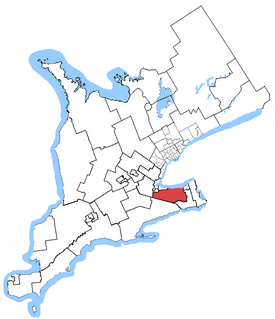
Niagara West—Glanbrook was a federal electoral district in Ontario, Canada, that existed from 2004 to 2015.
Erie—Lincoln was a federal electoral district in Ontario, Canada, that was represented in the House of Commons of Canada from 1997 to 2004, and was a provincial electoral district represented in the Legislative Assembly of Ontario from 1999 to 2007. This riding was created in 1996 from parts of Erie, Haldimand—Norfolk and Lincoln ridings.

Beamsville is a community that is part of the town of Lincoln, Ontario, Canada. It is located along the southern shore of Lake Ontario and lies within the fruit belt of the Niagara Peninsula. It contains century-old brick buildings, an old-fashioned downtown area with barbershops, women's dress shops, a bakery, a print shop, restaurants, banks, and other businesses, and plenty of orchards and vineyards.

The Lincoln and Welland Regiment is a Primary Reserve infantry regiment of the Canadian Army based in St. Catharines and Welland, Ontario.

Niagara West—Glanbrook was a provincial electoral district in south eastern Ontario, Canada between 2007 and 2018. It elected one member to the Legislative Assembly of Ontario.

Living Springs is an unincorporated rural community in Centre Wellington Township, Wellington County, Ontario, Canada. The settlement was part of West Garafraxa Township until 1999.

Niagara Centre is a provincial electoral district in Ontario, Canada, represented from 1867 until 1977 and again since 2007 in the Legislative Assembly of Ontario. Its population in 2006 was 112,875.
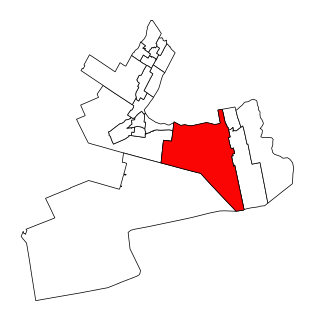
Niagara West is a federal electoral district in Ontario. It encompasses a portion of Ontario formerly included in the electoral districts of Niagara West—Glanbrook, Welland and St. Catharines. It is currently represented by Dean Allison.

Grimsby GO Station is a proposed commuter rail station on the GO Transit train and bus network in Southern Ontario, Canada. Located in the town of Grimsby in the Regional Municipality of Niagara, it would be a stop on the Lakeshore West line, east of the proposed Confederation GO Station in Hamilton. It was expected to open in 2021 and would have been the first station to open in the planned Niagara extension, which will also include stops at St. Catharines and Niagara Falls stations.
Stop the New Sex-Ed Agenda is a minor social conservative provincial political party in Ontario, Canada. It was founded by Queenie Yu, who also serves as its leader. It is a single issue party with a platform based on being in opposition to the updated sexual education curriculum for Ontario public schools implemented in 2015. Yu has stated on multiple occasions that the goal of the party is not to win seats, but rather to encourage others to oppose the curriculum.

